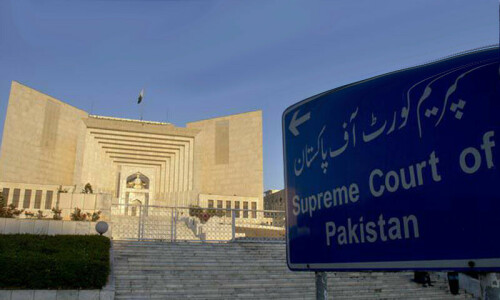ISLAMABAD: The Jamaat-i-Islami moved an application before the Supreme Court on Saturday seeking permission to become a party in the Punjab government’s review petition against the Feb 6 verdict, which ordered the release of a person accused of propagating “proscribed literature”.
Filed by former Islamabad High Court (IHC) judge Shaukat Aziz Siddiqui, the application explained that although the Punjab government has filed a review petition seeking an amendment to paragraph 9 of the Feb 6 judgement, the applicant believes that a review was required nevertheless.
A three-judge Supreme Court bench will resume hearing on the Punjab government’s petition on Monday (tomorrow).
The Punjab government’s review petition was filed by Additional Prosecutor General Ahmad Raza Gilani with a plea that the portion of the Feb 6 judgement regarding Article 20 of the Constitution needed to be modified on the premise that citizens’ rights were “not absolute and subject to law, morality and public order”.
Article 20 grants freedom to profess religion and to manage religious institutions.
The Jamaat contended that the court’s findings “directly impact the free exercise and preservation” of their faith by Muslims.
The application before this court was moved with an intent to assist the Supreme Court in “rectifying the error floating on the surface of the record”, the application said.
The JI believes, the application argued, that paragraphs 6 to 10 needed to be modified as these “travel beyond the constitutional mandate and jurisdiction bestowed upon the court”.
Constitutional guarantees
Moreover, the application expressed apprehensions, the order amounted to “impairing the constitutional guarantees” given to the people of Pakistan through the Constitution.
To all intents and purposes, the applicant is an “aggrieved, necessary and property party” seeking to render assistance with regard to “delicate and sensitive constitutional-cum-religious issues” brought before the Supreme Court, the application said.
The JI’s application regretted that there was a “prevailing sentiment” that the recent observations made by the apex court had “deviated from constitutional commands and jurisprudence” with regard to the “extent of freedom available to Qadianis”.
The petition recalled that the Supreme Court itself took note of the situation and issued a press release on Feb 22. The court’s recognition of an individual’s right to “assist it in correction” indicated that persons who believe there was an error in interpretation of an Islamic principle had a right to seek clarification or resolution.
“This shows the court’s commitment, openness and resolve to address concerns and ensuring justice, which is highly commendable.”
The Jamaat said that even though it was not a party in the first round of litigation, certain observations, directions and findings recorded in the Feb 6 judgment had caused “disturbance, unrest and emotional disorder amongst the public at large”, who believe that their religious feelings had been hurt by the Supreme Court’s order.
“The applicant has no doubt that the Feb 6 judgment was the result of inadvertence and lack of proper assistance on the subject,” the petitioner said.
Since the order contains references from the Holy Quran, interpretation of constitutional provisions and criminal law on the subject, the effect and scope of the order “travelled beyond the parties to the case”, the Jamaat contended.
Published in Dawn, February 25th, 2024













































Dear visitor, the comments section is undergoing an overhaul and will return soon.